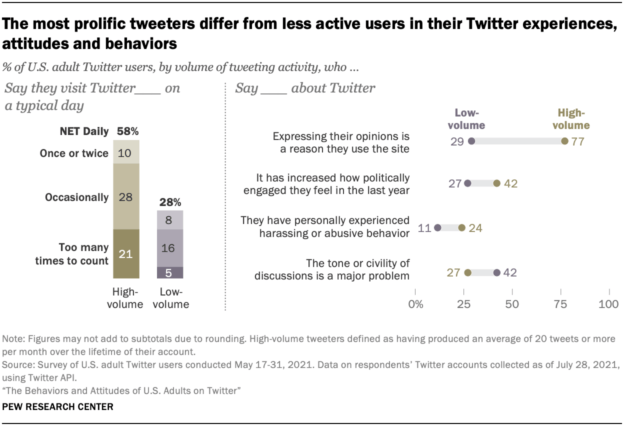From The Pew Research Center:
Roughly one-quarter of U.S. adults now use Twitter, and the site has become a space where users get news, discuss topics like sports, engage in personal communication or hear from elected officials.
Pew Research Center recently conducted an in-depth survey of U.S. adults who use Twitter, looking to better understand their behaviors and experiences on the site along with their attitudes towards the service. The survey included a subset of respondents who shared their Twitter profiles for research purposes, allowing their survey responses to be matched to their actual Twitter activity.
As in many of the Center’s surveys of technology and online platforms, this study finds that Twitter users report a mix of both positive and negative experiences on the site. For instance, 46% of these users say the site has increased their understanding of current events in the last year, and 30% say it has made them feel more politically engaged. On the other hand, 33% of users report seeing a lot of misleading or inaccurate information there, and 53% say inaccurate or misleading information is a major problem on the site.
The analysis also reveals another familiar pattern on social media: that a relatively small share of highly active users produce the vast majority of content. An analysis of tweets by this representative sample of U.S. adult Twitter users from June 12 to Sept. 12, 2021, finds that the most active 25% of U.S. adults on Twitter by tweet volume produced 97% of all tweets from these users.

High-volume tweeters differ from less prolific tweeters in important ways. A majority visit the site daily, and roughly one-in-five say they do so too many times to count on a typical day. Their use of Twitter also carries a more overtly political valence: They are more likely than others to say the site has increased how politically engaged they feel in the past year.
They also respond differently to the presence of certain negative interactions on the platform. High-volume tweeters are roughly twice as likely as others to say they have personally experienced harassing or abusive behavior on the platform (24%, vs. 11% of less active tweeters). But they are less likely to view the overall tone or civility of discussions on the site as a major problem (by a margin of 27% to 42%).
Link to the rest at The Pew Research Center
PG was an early adopter of Twitter (he has a tendency to try out a lot of new online services) and was also an early unadopter of Twitter.
As PG just examined the Twitter accounts with the largest following, he saw a lot of pop musicians, some over the hill, and a lot of other people he’s not interested in hearing from. Bill Gates, Elon Musk and Barack Obama are the only ones who might have something to say that’s interesting for PG, but, of course, you don’t really have the space to say anything of note in 280 characters.
Yes, you can insert a link in a Twitter message, but PG has no trouble naming a great many sites that offer curated links that have a high probability of being of interest to PG. The curated link sites will definitely include anything Bill, Elon and Barack have to say on any matter of substance.
But PG is likely not representative of any demographic of a size that interests advertisers, so he’s happy to let Twitter be Twitter and make money for tattooed entrepreneur Jack Dorsey and other shareholders as well as whoever buys Twitter from its present owners. He’ll continue to abstain.
“Twitter is a loud conversation in a small corner of a large room” – anon